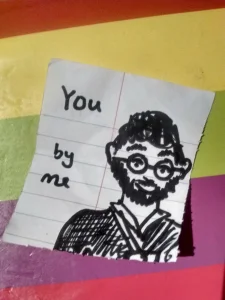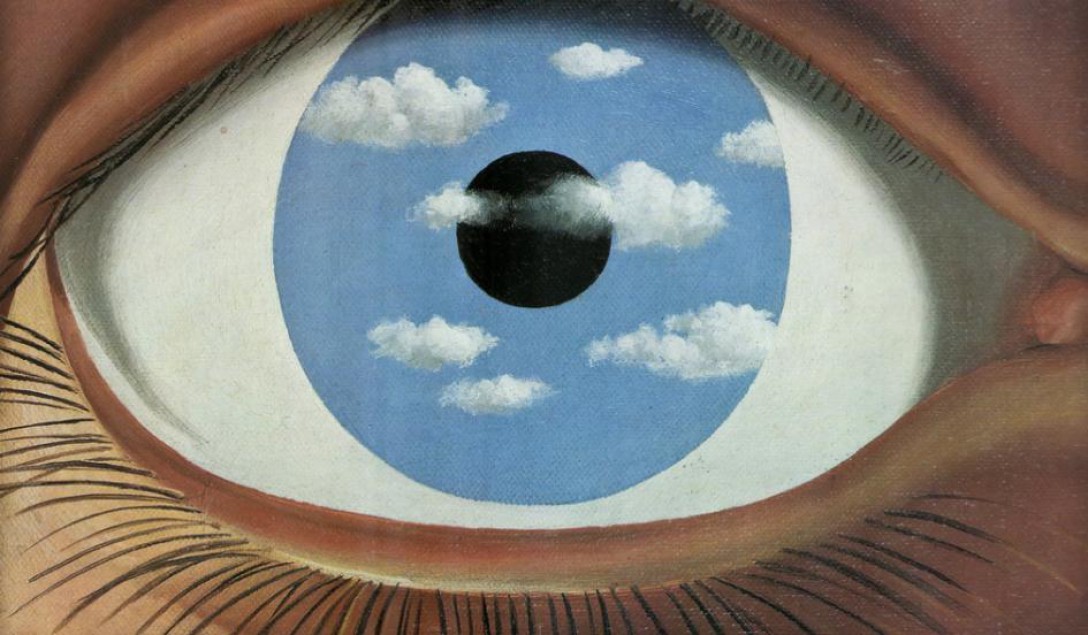Filial ferreting compounded in an anguishing feral existence shrouds the ability to recall moments that are trapped in a hazy indolent cloud due to a dearth in perspective. A relapse in time shatters the dimensions of thought as consecutive images from the past project into the future as the present imbibes the concoction. An interior monologue roughly sketched into a lucid dream montage creates an oxbow lake that has been dismembered adjacently from the aquamarine stream; consciousness relates to itself subjectively using associations present within time and space. Paraffin melts stealthily from a luminous candle that ignites ideas in the darkness of the cavernous cavity as pangs of receding pain fill the hole. Sustained periods of mourning and sadness exercise themselves frequently to reinforce the mutability of actions that have been exerted into our cranium indelibly. Pensive reflection instigates floods of repressed memories that have damaged the psyche irreparably: peeling the onion layer of anxieties that we have clothed ourselves in to function as part of society reveals depths of sinuous imagination and endless possibilities that reconstruct the gaunt mind.
Asymmetric snowflakes disperse in an unorganised flitter of precipitation as the clouds extol the unbalanced charges mixed congruously with the cold wind that precipitates in languor. The tongue releases its malignant stain of profanity in a breeze of contamination to discharge anger as if ejaculating fervently in a contagiously impotent environment. To be captive in a restless state of contemptuous derision and chafing malice seals the corrugated sadomasochist attachment of being in perennial disquiet with a lover. Deriving pleasure from pain is embedded within the familial relationship to the head of the opposing sex; an oppressive, dogmatic father chastises the daughter’s relentless pursuit for vaginal freedom and clitoral orgasm as he achieves an erection to cover his own insecurities. Baudelaire winces in a melancholy tone about the inebriates of lust in a conflagration of intemperance:
“My youth was a dark storm,
Crossed here and there by brilliant suns;
Thunder and rain have caused such quick ravage
That there remain in my garden very few red fruits.
Now I have touched the autumn of my mind,
And I must use the spade and rakes
To assemble again the drenched lands,
Where the water digs holes as large as graves.
And who knows whether the new flowers I dream of
Will find in this soil washed like a shore
The mystic food which would create their strength?
-O grief! O grief! Time eats away life,
And the dark Enemy who gnaws the heart
Grows and thrives on the blood we lose.”
Purple berries wilt away impertinently in an enshrined canvas of jagged thorns. The musicality of structure and form twines its long roots into the nourished soil, therewith producing symphonies of melodic enchantment, which enriches the malleable soul to extract the pure vestiges of rudimentary beauty from its constituent parts, akin to the extraction of iron from iron ore in a blast furnace. A flying squirrel glides ephemerally in an ethereal landscape, moving between figs and cypresses effortlessly as the scarlet cherry tree hosts the claws attached to its tender branch. The aesthetic ideal is an imperfection that can never be realised. All art is vanity. Demonstrating the deep richness of human emotion with a delicate brushstroke embalms the portrait of the artist into revealing his or her identity.
Schiller: “The transition from the passive condition of perceiving to the active one of thinking and willing is only effected, then, through an intermediate condition of aesthetic freedom, and although this condition in itself decides nothing in respect to our judgement or our opinions, and consequently leaves our intellectual and moral values completely problematical, it is yet the necessary condition by which alone we can attain to a judgement and to an opinion. In a word, there is no other way to make the sensuous man rational than by first making him aesthetic.”
Arsenic culls the pulverising vapour that binds to the intermolecular structure of a diamond crusted, opaque molecule as the carbon double bond bends with the corrigibility of pressure and temperature. The ninety two elements of the earth suffuse to explain away the mechanical processes of the palpable world using numerical theories that excuse the fault of human reasoning and bias; tungsten blades can erase the hair from your face but you won’t calculate the feeling behind it. Silicon pelleted glass fractures when refracted transparent light shifts its spectrum according to frequency and amplitude. The perceived view is of a higher aptitude when an object is closer to the person than further away; swooning draughts of love are more intoxicating when we face the fear of the emotion in question and isolate ourselves onto an island of mercury vested meditation. The concept of memory is diluted in radiance with the emotion felt at that point in time, the appending objects in the scene of the recollected image and the various facets of subtle insidious changes in body language, sentence construction and facial recognition. One image can affix itself to another using a chain of mediated associations that links back to memory learnt over a lifetime.
Faust and Hamlet’s violet rhododendron of fruitful passages concerning the attack of scientific progress and man’s obsession with knowledge sets the play for the music of temperaments to hum aloud in vicarious healing. A disinterested opiate that enshrouds the caricature of personages over time using imbibed reflection and jaunty imagination is what is dispelled in a catharsis of epic tragedy culminating in the tearful and heroic suicide of the chief procrastinator. Mountains move in unison with the orange twilight sky as the poetry injects its temperamental poison into the veins of the plaintive thinker. As Dylan Thomas recites painfully, attesting to Joyce’s serum:
“Not for the proud man apart
From the raging moon I write
On these spindrift pages
Nor for the towering dead
With their nightingales and psalms
But for the lovers, their arms
Round the griefs of the ages,
Who pay no praise or wages
Nor heed my craft or art.”
THE END (of laughter and soft lies)

